2018年人教新目标英语七下unit 2《What time do you go to school》the third period课件
人教七年级下册Unit2Whattimedoyougotoschool知识点总结
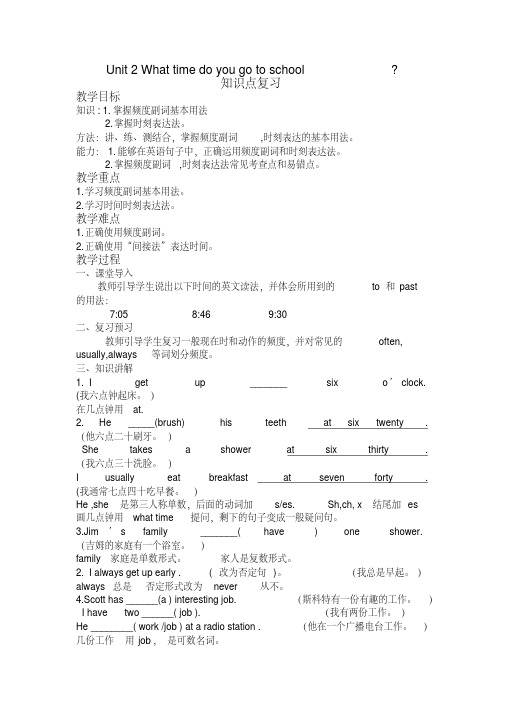
_______( have
)
one
shower.
(吉姆的家庭有一个浴室。 )
family 家庭是单数形式。
家人是复数形式。
2. I always get up early .
( 改为否定句 )。
(我总是早起。 )
always 总是 否定形式改为 never 从不。
4.Scott has ______(a ) interesting job.
and_____________(vegetable )
for lunch.
(十二点钟,她午餐吃许多水果和蔬菜。 )
许多 a lot of = lots of
可数不可数都可以用。
much 修饰不可数名词
many + 可数名词的复数形式。 )
20. After lunch , she sometimes ______(play ) volleyball.
do 是助动词,两个 do 都不能去掉。
用了 does, 后面的动词用原形。
18. I _____watch TV or play computer games in the evening .
(我晚
上要么看电视要么玩电子游戏。 )
Either you or he ________(clean ) the classroom.
for breakfast .
Don ’ t have = have no 没有。
时间 time 是不可数名词名词。
( 我没有许多时间吃早餐。 )
15. He eats a ________(good ) breakfast .
( 他吃好的早餐。 )
I play ping-pong _______(good ).
新目标七年级下Unit 2 What time do you go to school?( sectionA)

eat breakfast
What time do you usually eat breakfast? I usually eat
breakfastat seven o’clock .
go to school
What time do you usually go to school? I usuallygo to school at seven thirty _____________
18:00
What time is it , please? It’s three ten .
What time is it , please? It’s three forty-five .
What time is it , please? It’s seven twenty .
What time is it , please? It’s nine twenty-five .
have five classes in the morning. And then I have lunch at . In the afternoon I have two . I get home at
classes. I go home at
4:30p.m. I
I . I
at about
at
Rick’s family shower’s time
2b
Listen , complete the schedule.
Time 5:00 6:00 7:00 8:00 9:00 Name Bob
Mary
Jerry Rick Alicia
Read the passage. Then match the pictures with the correct clocks.
新目标英语七下unit 2whattimedoyougotoschool必背知识点重点短语和句子
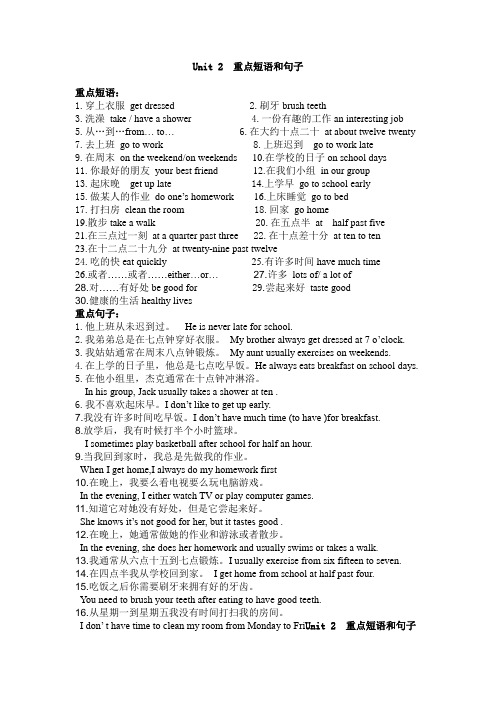
Unit 2 重点短语和句子重点短语:1.穿上衣服get dressed2.刷牙brush teeth3.洗澡take / have a shower4.一份有趣的工作an interesting job5.从…到…from… to…6.在大约十点二十at about twelve twenty7.去上班go to work8.上班迟到go to work late9.在周末on the weekend/on weekends 10.在学校的日子on school days11.你最好的朋友your best friend 12.在我们小组in our group13.起床晚get up late 14.上学早go to school early15.做某人的作业do one’s homework 16.上床睡觉go to bed17.打扫房clean the room 18.回家go home19.散步take a walk 20.在五点半at half past five21.在三点过一刻at a quarter past three 22.在十点差十分at ten to ten23.在十二点二十九分at twenty-nine past twelve24.吃的快eat quickly 25.有许多时间have much time26.或者……或者……either…or…27.许多lots of/ a lot of28.对……有好处be good for 29.尝起来好taste good30.健康的生活healthy lives重点句子:1.他上班从未迟到过。
He is never late for school.2.我弟弟总是在七点钟穿好衣服。
My brother always get dressed at 7 o’clock.3.我姑姑通常在周末八点钟锻炼。
My aunt usually exercises on weekends.4.在上学的日子里,他总是七点吃早饭。
人教版七年级下册英语《Unit2Whattimedoyougotoschool》词句精讲精练
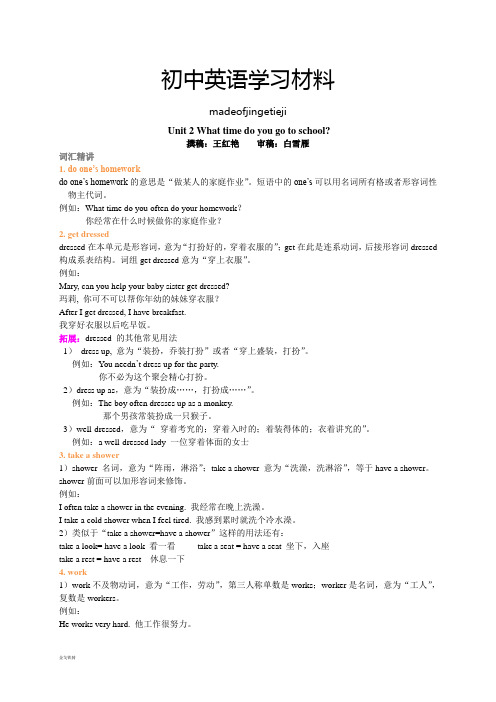
初中英语学习材料madeofjingetiejiUnit 2 What time do you go to school?撰稿:王红艳审稿:白雪雁词汇精讲1. do one’s homeworkdo one’s homework的意思是“做某人的家庭作业”。
短语中的one’s可以用名词所有格或者形容词性物主代词。
例如:What time do you often do your homework?你经常在什么时候做你的家庭作业?2. get dresseddressed在本单元是形容词,意为“打扮好的,穿着衣服的”;get在此是连系动词,后接形容词dressed 构成系表结构。
词组get dressed意为“穿上衣服”。
例如:Mary, can you help your baby sister get dressed?玛莉, 你可不可以帮你年幼的妹妹穿衣服?After I get dressed, I have breakfast.我穿好衣服以后吃早饭。
拓展:dressed 的其他常见用法1)dress up, 意为“装扮,乔装打扮”或者“穿上盛装,打扮”。
例如:You needn’t dress up for the party.你不必为这个聚会精心打扮。
2)dress up as,意为“装扮成……,打扮成……”。
例如:The boy often dresses up as a monkey.那个男孩常装扮成一只猴子。
3)well-dressed,意为“穿着考究的;穿着入时的;着装得体的;衣着讲究的”。
例如:a well-dressed lady 一位穿着体面的女士3. take a shower1)shower 名词,意为“阵雨,淋浴”;take a shower 意为“洗澡,洗淋浴”,等于have a shower。
shower前面可以加形容词来修饰。
例如:I often take a shower in the evening. 我经常在晚上洗澡。
人教版七年级英语下册《Unit 2 What time do you go to school》教案

《Unit 2 What time do you go to school》教案Teaching objectives knowledgeThetarget1. Learn and master the following words:up get up dress g et dressed brush toothshower take a shower usually forty wownever early fifty job work station radiostation o’clock night funny exercise2. To learn to ask and talk about the spokenlanguage of the time, make the schedule:-What time do you usually take a shower?-I usually take a shower at six forty.-What time do you usually get up?-I usually get up at eight thirty at night.AbilitytoThetarget1) learning with credit to special questions abouttime and time.2) with the knowledge of the target language t o lifeand learning activities to make plans, to reasonablyarrange work and rest time.emotionalTheSection A, talk about the topic is "routine" time,the learning content close to student's life, becausethe students' work and rest time arrangement is verytarget regular. By asking each other or talk about yourself or a loved one's work and rest time arrangementand activity plan, and punctuality can cultivatestudents' good habit, the habit.Teaching important points Learn to ask and talk about time and make the schedule.Teaching difficultpoints Credit to guide the expression of special questionsand time.The teachingmethodTask-based teaching method and teaching.。
七年级英语下册Unit2Whattimedoyougotoschool教案新版人教新目标版
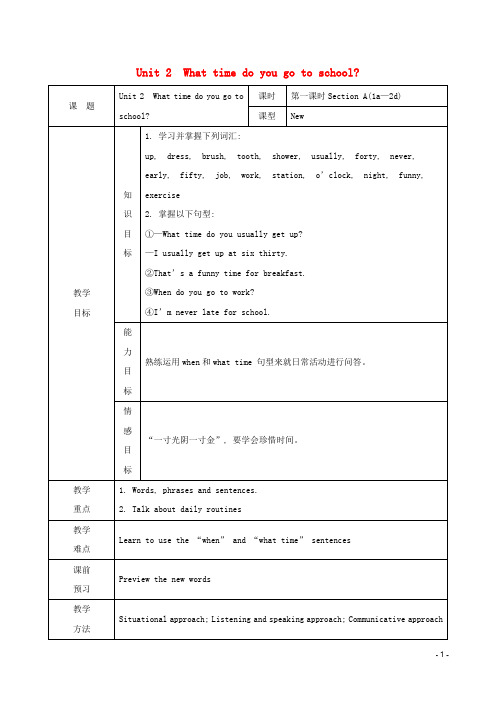
②When does Scott go to work?
③He always goes to work at seven o’clock.
能力目标
1.掌握What time及When特殊疑问句及其答语。
2.熟练使用频度副词
Summarize how to use what time to ask about their daily activities.
培养学生探究、归纳总结能力。
续表
教学环节
教师活动
学生活动
备课札记
Step 8
Consolidation
教师设置巩固检测练习:
Ⅰ.用所给词的适当形式填空
1. What time do you getdressed(dress) every morning?
2. Ss talk about themselves in pairs.
通过利用“信息差”进行口语结对活动,在交流信息过程中,进行真实的交际问答活动。
Step 6
Role-play (2d)
1. Let Ss read the conversation of 2d and answer the questions below.
2. Play the tape of2a.
3. Let Ss look at the chart of 2b carefully.
4. Play the tape of 2b.
1. Ss read the sentences in the box in2abefore listening to the tapபைடு நூலகம்.
七年级英语下册Unit2Whattimedoyougotoschool说课稿新版人教新目标版

Unit 2 What time do you go to school一、说教材(一)教材分析:1、教材简析:人教版《新目标英语》七年级下册第二单元中心话题是通过对日常生活作息时间的谈论,让学生学会时间的表达法.主要学习用what time和when来引导的特殊疑问句询问时间的标准用法,还有不同时间段的表达法以及表示频率副词的学习。
通过本单元的学习使学生学会不同时间段的表达法,学会用频率副词谈论自己日常生活习惯.通过对不同时间段的系统学习和理解,学会调整和安排自己的学习和课外活动时间,能够运用所学知识对某一活动进行合理的安排;使学生深刻理解时间的重要性,学会珍惜时间,并逐步养成良好的作息习惯.2、教学目标(知识目标、能力目标、德育目标)知识与能力:(1)掌握Section A 1a—2c和Section B 2a出现的单词和短语:time, what time, usually, get up, go to school, go home, shower, take a shower, do one’s homework, go to bed(2)掌握运用重点句型:What time do you usually get up; I usually get up at six o’clock/six thirty。
What time does she/he usually get up; She/He usually gets up at six o'clock/six thirty.过程与方法:通过运用英语正确表达时间和谈论日常作息安排,提高学生的综合语言运用能力。
情感、态度与价值观:通过学习,使学生充分认识时间的重要性,让学生养成良好的作息习惯和培养学生珍惜时间的优良品质。
确立教学目标的依据:以《英语课程标准》为理论依据,通过听、说、读、写四项基本语言技能的训练,激发学生的学习兴趣,帮助学生树立自信心和建立学习成就感,使他们在语言学习实践过程中发展综合运用能力.此外,根据教学内容,把培养学生的情感融化到日常教学当中。
七年级新目标下Unit_2_What_time_do_you_go_to_school教案
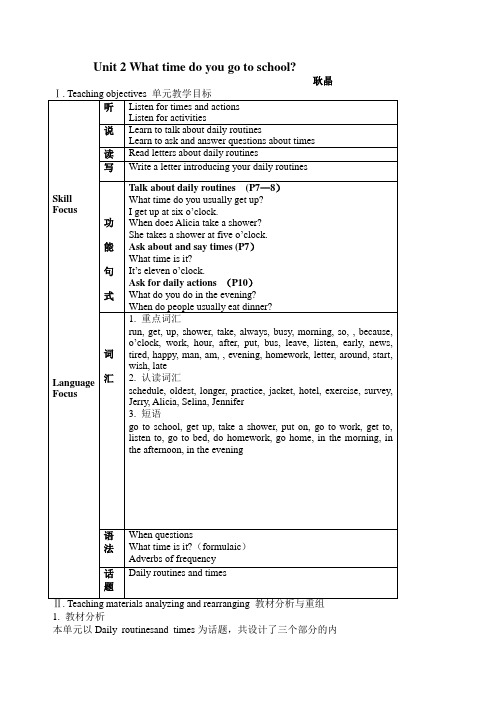
Unit 2 What time do you go to school?耿晶1. 教材分析本单元以Daily routinesand times为话题,共设计了三个部分的内容。
旨在通过单元教学使学生学会谈论日常行为、询问并答复有关时间的问题、询问并回答人们在特定时间所从事的活动。
Section A 学习谈论日常作息时间。
1a, 1b, 1c 重点学习和学生息息相关的几种日常行为的英文表示方法,学会询问和答复日常作息时间。
2a, 2b, 2c ,2d继续学习谈论自己或他人的日常作息时间。
重点学习如何询问,这也是本单元的语法重点。
3a, 3b, 3c 学会叙述他人的日常活动安排,同时学习询问时间和时间表达法,进一步巩固询问别人的日常作息时间的表达法。
Section B 继续学习询问和谈论别人的日常行为。
1a, 1b, 2a, 1c,1d,1e,学会谈论和询问一天内各个时间段的活动安排。
2a,2b,3a,3b学会通过两个人的对比介绍来判断并养成好的作息时间。
Self check 重点单词句型复习2. 课型设计与课时分配Period 1 Listening and speaking (I)(Section A: 1a, 1b, 1c)Period 2 Listening and speaking (II)(Section A:2a, 2b, 2c,2d)Period 3 Integrating skills(Section A:3a, 3b, 3cSection B: 1a, 1b,1c,1d,1e)Period 4 Reading and writing(Section B:2a, 2b, 2c,3a,3b)Period 5 Self checkⅢ. Teaching plans for each periodPeriod 1 Listening and speaking(Ⅰ) Target language目标语言1. Words && phrases生词和短语Up,get up,dress,get dressed,brush,tooth,shower,take a shower,usually,forty, what time,2. Key sentences重点句子When do people usually ...? People usually ...What time do you usually ...? I usually ...Ability goals能力目标Enable students to learn to talk about daily routines.Learning ability goals学能目标Help the students learn how to talk about daily routines.Teaching important / difficult points教学重难点How to talk about daily routines.Teaching aids教具准备A tape recorder and a model clock.Teaching procedures and ways教学过程与方式Step ⅠWarming upIn this procedure, motivate students to learn some words and phrases by singing the songs they’ve learned before.T: Good morning, everyone. (sing) “Good morning to you. Good morning to you. Good morning, dear children. Good morning to you.” This song is easy to learn. Who can sing it to us?Encourage students to sing the song.T: Well done. Thank you! We sing “Good morning to you” in the morning. Then what do we sing in the afternoon and in the evening? S: We sing Good afternoon to you in the afternoon and Good evening to you in the evening.T: That’s right. I know all of you are very good at singing. Does anyone want to sing Good afternoon to you or Good evening to you to us?Step ⅡTalking and reading (1a)In this procedure, ask students to finish the required task and learn some key phrases about daily actions.T: As we all know, time is very important and in English there is a famous saying "An hour in the morning is worth two in the evening." So what do you do in the morning?S1: I read English. S2: I do morning exercise.T: And what do you do in the afternoon and in the evening?S1: I play basketball in the afternoon. S2: I watch TV in the evening.T: I’m very glad to hear that. You use your time very well. And there’re many daily things we can do. Now let’s read these phrases in 1a and match these actions and the time of day.Step ⅢPracticeIn this procedure, students will learn how to talk about actions and the time of day.T: I know you’re very clever. Now I want you to tell if my statements are right or wrong. First, I usually eat dinner in the morning. S: Wrong.T: When do I usually eat dinner? S: In the evening.T: Second, she gets up at 19:00 in the morning. S: Wrong.T: What is the correct way of saying the sentence? S: She gets up at 7:00 in the morning.T: How clever you are! Now let’s read the conversation in groups and see which group reads better.Ask students to do pairwork.T: Please ask your partner when people usually do these things: do homework, eat dinner, eat breakfast and go to bed.(Write “When do people usually ...”on the blackboard)Sample dialogue:S1: When do people usually do homework?S2: People usually do homework in the afternoon.Interest the students in going on practicing the conversation using a new way of reading.T: Now let’s try a new way of reading. First I name one student to ask a question, and then ask all of you repeat this question together. After that, I name another student to answer this question, and all of you repeat the answer together.Sample dialogue:S1: When do people usually go to bed?S: When do people usually go to bed?S2: People usually go to bed in the evening.S: People usually go to bed in the evening.Step ⅣTalking about time (1c)In this procedure, students will learn how to ask about and say hour times and learn some key phrases about daily routines.T: Boys and girls, please listen to what I’m saying and guess what it is. 小小骏马不停蹄,日日夜夜不休息,蹄声哒哒似战鼓,提醒人们争朝夕。
人教7七年级初一下新版第二单元unit2 what time do you get up讲学稿导学案知识点讲解
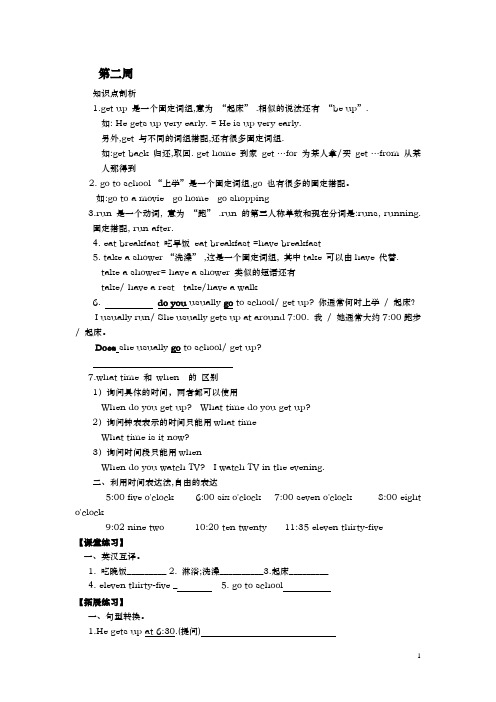
第二周知识点剖析1.get up 是一个固定词组,意为“起床” .相似的说法还有“be up”.如: He gets up very early. = He is up very early.另外,get 与不同的词组搭配,还有很多固定词组.如:get back 归还,取回. get home 到家get …for 为某人拿/买get …from 从某人那得到2. go to school “上学”是一个固定词组,go 也有很多的固定搭配。
如:go to a movie go home go shopping3.run 是一个动词, 意为“跑” .run 的第三人称单数和现在分词是:runs, running.固定搭配, run after.4. eat breakfast 吃早饭eat breakfast =have breakfast5. take a shower “洗澡” ,这是一个固定词组, 其中take 可以由have 代替.take a shower= have a shower 类似的短语还有take/ have a rest take/have a walk6. do you usually go to school/ get up? 你通常何时上学/ 起床?I usually run/ She usually gets up at around 7:00. 我/ 她通常大约7:00跑步/ 起床。
Does she usually go to school/ get up?7.what time 和when 的区别1)询问具体的时间,两者都可以使用When do you get up? What time do you get up?2)询问钟表表示的时间只能用what timeWhat time is it now?3)询问时间段只能用whenWhen do you watch TV? I watch TV in the evening.二、利用时间表达法,自由的表达5:00 five o'clock 6:00 six o'clock 7:00 seven o'clock 8:00 eight o'clock9:02 nine two 10:20 ten twenty 11:35 eleven thirty-five【课堂练习】一、英汉互译。
七年级英语下册《Unit2 What time do you go to school Period 2》人教新目标版

七年级下册Unit2 What time do you go to school? 导学案 Period2【学习目标】1.知识目标:巩固表示日常作息的词汇。
2.技能目标:熟练表达自己一天作息情况。
3.情感目标:培养学生良好的生活习惯。
【学习重难点】熟练掌握表达一天作息的句型。
【学习过程】:一、自主复习1.试翻译下列句子。
你每天什么时候起床?______________________________________________我每天六点穿衣。
___________________________________________________她每天六点十分刷牙。
______________________________________________他总是七点半吃早饭。
______________________________________________他每天晚上八点洗澡。
______________________________________________二、对话练习听2d录音跟读模仿。
Pair work 两人展示:Interviewer: Scott has an interesting job. He works at a radio station.Scott, what time is you r radio show?Scott: From twelve’s o’clock at night to six o’clock in the morning. Interviewer: What time do you usually get up?Scott: At eight thirty at night. Then I eat breakfast at nine. Interviewer: That’s funny time for breakfast.Scott: Yeah. After that, I usually exercise at about ten twenty. Interviewer: When do you go to work?Scot t: At eleven o’clock, so I’m never late for work.Group work: 小组合作:调查本组内成员信息,展示调查结果。
人教新目标七年级下册 Unit 2 What time do you go to school课件

_7_. c_l_e_a_n_m__y_room
3. eat breakfast _7__:0_0__a._m__. __8_. e_a_t__d_in_n_e_r _7_:_1_5_p_._m__. _
4. go to school _7_:_4_5_a_._m__. _ 9. take a walk __________
Look at the pictures and then ask and answer. What time/ When do you usually …? I usually … at …?
When do you usually have the class? I usually have the class at eight o’clock.
6:30 a.m. half past six in the morning 3:15 p.m. a quarter past three in the afternoon 6:45 p.m. a quarter to seven in the evening 9:45 p.m. a quarter to ten in the evening
10:00 p.m.
1c Listen and circle the activities you hear.
1. get up 5:30 _2_. r_u_n______________
6. do my homework _________ 7. clean my room _________
3. eat breakfast
8. eat dinner _________
_4_. g_o__t_o_s_c_hool _________ 9. take a walk _________
新版(人教版)七年级(下)英语Unit2课文详解
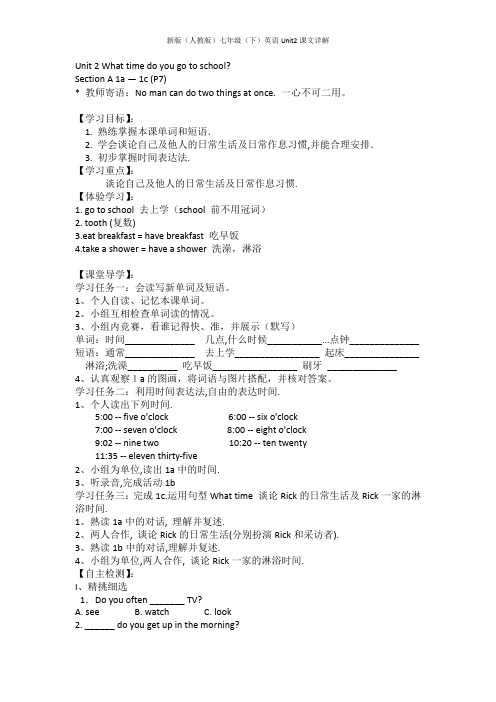
Unit 2 What time do you go to school?Section A 1a — 1c (P7)* 教师寄语:No man can do two things at once. 一心不可二用。
【学习目标】:1. 熟练掌握本课单词和短语.2. 学会谈论自己及他人的日常生活及日常作息习惯,并能合理安排.3. 初步掌握时间表达法.【学习重点】:谈论自己及他人的日常生活及日常作息习惯.【体验学习】:1. go to school 去上学(school 前不用冠词)2. tooth (复数)3.eat breakfast = have breakfast 吃早饭4.take a shower = have a shower 洗澡,淋浴【课堂导学】:学习任务一:会读写新单词及短语。
1、个人自读、记忆本课单词。
2、小组互相检查单词读的情况。
3、小组内竞赛,看谁记得快、准,并展示(默写)单词:时间______________ 几点,什么时候___________...点钟______________ 短语:通常______________ 去上学_________________ 起床_______________ 淋浴;洗澡__________ 吃早饭_________________ 刷牙______________4、认真观察1a的图画,将词语与图片搭配,并核对答案。
学习任务二:利用时间表达法,自由的表达时间.1、个人读出下列时间.5:00 -- five o'clock 6:00 -- six o'clock7:00 -- seven o'clock 8:00 -- eight o'clock9:02 -- nine two 10:20 -- ten twenty11:35 -- eleven thirty-five2、小组为单位,读出1a中的时间.3、听录音,完成活动1b学习任务三:完成1c.运用句型What time 谈论Rick的日常生活及Rick一家的淋浴时间.1、熟读1a中的对话, 理解并复述.2、两人合作, 谈论Rick的日常生活(分别扮演Rick和采访者).3、熟读1b中的对话,理解并复述.4、小组为单位,两人合作, 谈论Rick一家的淋浴时间.【自主检测】:I、精挑细选1.Do you often _______ TV?A. seeB. watchC. look2. ______ do you get up in the morning?A. WhereB. What timeC. How3. When ______ Tom take a shower?A. doesB. doC. has4. What time does Ann ______ every day?A. go schoolB. go to the schoolC. go to school5. -----What time is it ?------It’s ______ 7:00. We often have breakfast ____7:00A. at, atB. /, atC. at, /II、按要求改写句子.1. Alicia takes a shower at 9:00.(提问划线部分)______________________________________?2. Mary takes a shower at 8:00.(变一般疑问句)_________ Mary ________ a shower at 8:00?3. I usually go to bed at 10:00.(变否定句)I _______ usually _______to bed at 10:00.4. She often runs in the morning.(对划线部分提问)________ _________ she often _________?5.I usually get up at five o’clock every day. (对划线部分提问)________ _________ ________ you get up every day?Unit 2 What time do you go to school?Section A 2a— 2d(P8)* 教师寄语:No man can do two things at once. 一心不可二用。
人教版新目标版七年级英语下册 Unit 2 What time do you go to school教案
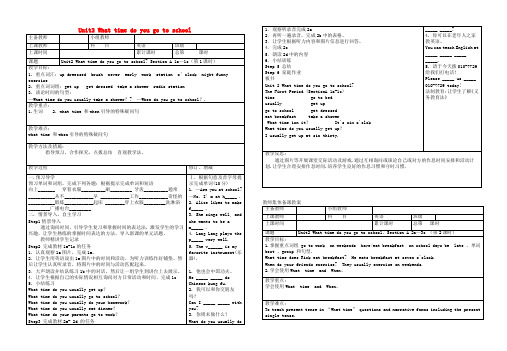
7. 3a: Use“always”,”usually”, or“never”to make sentences.
8. 3b :Let students write about something they do.
Step3 3c :1.make an interview 2. write a short passage
What time do you usually eat dinner?
What time do your parents go to work?
Step3 完成教材2a- 2d 的任务
1.观察听录音完成2a
2.再听一遍录音,完成2b中的表格。
3.让学生根据听力内容和图片信息进行回答。
4.完成2c
5.朗读2d中的内容
2. 重点词词组:get up get dressed take a shower radio station
3. 谈论时间的句型:
—Whattimedo youusuallytake a shower?? —When do you go to school?.
教学重点:
1.生词 2. what time 和when引导的特殊疑问句
1. 他也会中国功夫。
He__________do Chinese kung fu.
2. 我可以和你交朋友吗?
Can I__________with you?
3. 你周末做什么?
What do you usually do__________?
4. 你可以在老年人之家教英语。
You can teach English at____________________.
人教版七年级英语下册Unit 2 What time do you go to school知识点归纳总结

Unit 2 What time do you go to school?◆短语归纳1. what time 几点2. go to school 去上学3. get up 起床 go to bed 上床睡觉(反义词get up )4. take a shower = have a shower 洗淋浴5. brush teeth 刷牙6. get to 到达7. do homework 做家庭作业 8. go to work 去上班(反义词 go home )9. go home 回家 10. eat breakfast 吃早饭 11. get dressed 穿上衣服12. get home 到家13. either…or… 要么…要么… 14. make breakfast 做早饭15. in the morning/ afternoon/ evening 在上午/下午/晚上 16. take a walk 散步17. lots of=a lot of 许多,大量 18. radio station 广播电台 19. at night 在晚上20. be late for=arrive late for 迟到21.make a shower schedule 做一个洗澡的安排22. have breakfast/dinner/lunch 吃早晚午饭 23.get to work 到达工作岗位24.practice guitar 练吉它25.leave home 离家26.go to class 上课27.take the Number 17 bus to the Hotel 乘17路公共汽车去旅馆◆用法集萃 ◆典句必背 1. What time do you usually get up? I usually get up at six thirty. 2. That’s a funny time for breakfast. 3. When do students usually eat dinner? They usually eat dinner at a quarter to seven in the evening.4. In the evening, I either watch TV or play computer games.5. At twelve, she eats lots of fruit and vegetables for lunch..6. She knows it’s not good for her, but it tastes good.7. Here are your clothes.◆语法1. at + 具体时间点 在几点(几分)2. eat breakfast/ lunch/dinner 吃早饭/午饭/晚饭3. thirty\half past +基数词 ……点半4. fifteen\a quarter to +基数词 差一刻到……点5. take a/an +名词 从事……活动6. from …to … 从……到……7. need to do sth 需要做某事8.around six o’clock 六点左右9.tell sb. about sth. 告诉某人某事 tell sb. to do sth. / tell sb. Sth. 10.know about sth. 知道某方面的情况 11.love to do/doing = like to do/doing 喜欢干某事 12.Listen to the early morning news on radio 听电台早间新闻 13.watch the early morning news on TV 看电视早间新闻1、英语时间的表达(1)整点时间可表示为“钟点数+o’clock”或直接读钟点数,省去o’clock。
人教版新目标七年级英语下册Unit2Whattimedoyougotoschool语法篇试题含答案

人教版新目标七年级英语下册Unit2Whattimedoyougotoschool语法篇试题学生通过本讲学习,能够掌握本单元的重点语法,并在综合能力上有一定的拓展。
一、what time与when1.what time翻译为“几点”问的是具体的时间,一般回答要具体到小时。
What time do you go to school?你什么时候/几点上学?I go to school at half past seven o’clock.我七点半去上学。
回答具体到点钟,且注意在几点前边的介词用at。
2.when也是对时间的提问,但与what time的区别是:用when提问,回答既可以是具体的时间,也可以是不具体的时间,如:in the morning,last year,in 1998等范围大的时间,例如:When does he take a shower?他什么时候洗澡?He takes a shower in the morning.他在早上洗澡。
也可用具体时间:I take a shower at 6 o’clock in the morning.我早上六点洗澡。
3. 问对方时间点只能用what time,如What time is it?二、频率副词的使用用法几个频率副词的用法★alwaysalways 意为“总是”,与进行时态连用时,可以表示赞扬,也可以表示讨厌等感情色彩。
e.g.(1)I shall always remember my first day at school. 我将永远记住我上学的第一天。
(2)He is always smoking. 他总是抽烟。
★usuallyusually可以指通常的动作,但是侧重已经形成的习惯,它是从已经形成的角度来说明动作。
e.g.(1)I usually do some shopping with my parents on Sundays. 我经常在星期天和我的父母一起去买东西。
新目标版英语七年级下册Unit2Whattimedoyougotoschool?(SectionA)含答案

新目标版英语七年级下册Unit 2 What time do you go to school?(Section A)一、根据句意及首字母提示完成句子1、根据句意及首字母提示完成句子(1)Tom is very young. He can't get d________ by himself(他自己).(2)Jim is seven years old. He can b________ his teeth in the morning.(3)—What's ten and thirty?—It's f________.(4)I always get up e________. I never get up late.(5)There are many(许多的)buses(公共汽车)at the bus s________.二、用所给词的适当形式填空2、用所给词的适当形式填空(1)—What time do you usually________ (eat) breakfast?—At seven thirty.(2)“That's a ________ (fun) time for breakfast.(3)________ (Lily) family has a cat. It's very interesting.(4)Jim usually ________ (do) his homework after school.(5)He ________ (brush) his teeth after he gets up every morning.三、从方框中选择合适的单词并用其正确形式完成句子3、从方框中选择合适的单词并用其正确形式完成句子(1)What do you ________ do on Sundays?(2)I ________ walk to school when it's sunny.(3)My father gets up early every day, so he is ________ late for work.(4)The sun(太阳) ________ rises(升起) in the east(东方) and sets in the west.(5)Tina finds a good ________. She ________ very hard (努力地) every day.(6)Mary wants to be a singer. She thinks it's an interesting ________.四、单选题4、Li Ming is the best student in our class. He __________ gets good grades(成绩).A、alwaysB、sometimes(有时)C、neverD、often5、Cathy was born blind(天生是盲的), so she has __________ seen our beautiful world.A、oftenB、sometimesC、seldom(很少)D、never6、My father, Mr. White, often __________ at six twenty in the morning.A、get upB、go upC、gets upD、go to bed7、Kate takes a shower at 8 o'clock in the evening.(替换画线部分)A、playsB、lovesC、hasD、brings8、—Do you like this movie?—Yes, it's the __________ one I've ever seen(曾经看过的).A、betterB、bestC、goodD、well9、—When do you go to school?—We go to school __________ Monday __________ Friday.A、on; toB、from, toC、in; andD、in, to10、Could I have an early morning call __________ six o'clock tomorrow(明天) ?A、onB、toC、atD、in11、The child doesn't need any help. He is old enough to __________ himself.A、put onB、wearC、dressD、take care12、__________ your father __________ watching TV in the evening?A、Does, likesB、Does, likeC、Is; LikesD、Do, likes13、Susan __________ her homework at school every weekend.A、don'tB、don't doC、doesn'tD、doesn't do五、按要求改写句子14、按要求改写句子(1)He wants to know about my weekend.(改为一般疑问句并作否定回答)________ he ________ to know about your weekend?No, he ________.(2)She goes to school at seven thirty.(改为否定句)She ________ ________to school at seven thirty.(3)She often has dinner at half past six in the evening(对画线部分提问)________ ________ does she often have dinner in the evening?(4)I take a shower at 8:00 in the morning.(对画线部分提问)________ ________ you ________ a shower in the morning?(5)I usually learn English at eight on the radio.(用he代替I改写句子)He ________ ________ English at eight on the radio.六、根据汉语完成句子15、根据汉语完成句子(1)—你几点钟锻炼?—我通常五点五十锻炼。
人教版(新目标)初中英语七年级下册Unit 2
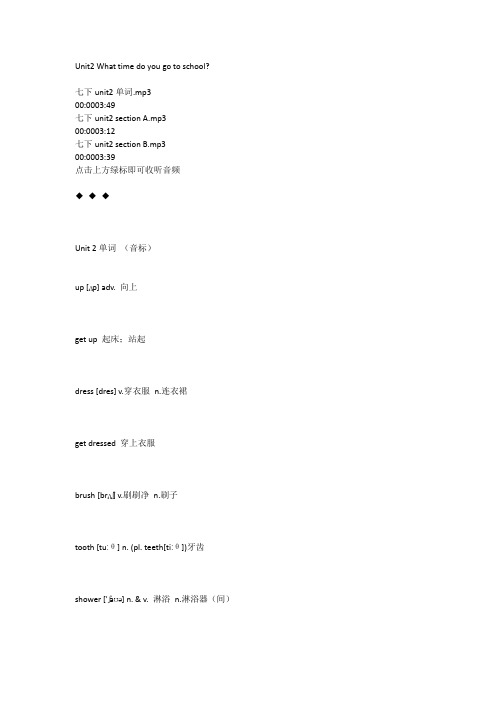
Unit2 What time do you go to school?七下unit2单词.mp300:0003:49七下unit2 section A.mp300:0003:12七下unit2 section B.mp300:0003:39点击上方绿标即可收听音频◆◆◆Unit 2单词(音标)up [ʌp] adv. 向上get up 起床;站起dress [dres] v.穿衣服n.连衣裙get dressed 穿上衣服brush [brʌʃ] v.刷刷净n.刷子tooth [tuːθ] n. (pl. teeth[tiːθ])牙齿shower ['ʃaʊə] n. & v. 淋浴n.淋浴器(间)take a shower 洗淋浴usually ['ju:ʒuəli] adv.通常地;一般地forty ['fɔ:(r)ti] num.四十wow [waʊ] interj.(表示惊奇或敬佩)哇;呀never ['nevə(r)] adv.从不;绝不early ['ɜːlɪ] adv. & adj.早(的)fifty ['fɪftɪ] num.五十job [dʒɒb], [dʒɑːb] n.工作;职业work [wɜːk] v. & n. 工作station ['steɪʃn] n.电(视)台;车站radio station 广播电台o'clock [ə'klɒk], [ə'klɑ:k] adv.(表示整点)……点钟night [naɪt] n. 晚上;夜晚funny ['fʌnɪ] adj.奇怪的;滑稽好笑的exercise ['eksəsaɪz] v. & n. 锻炼;练习on weekends (在)周末best [best] adj.最好的adv.最好地;最group [gruːp] n.组;群half [hɑːf], [hæf] n. & pron. 一半;半数past [pɑːst],[pæst] prep.晚于;过(时间)adj.过去的quarter ['kwɔː(r)tə(r)] n.一刻钟;四分之一homework['həʊmwɜː(r)k] n. 家庭作业do (one’s) homework 做作业run [rʌn] v. 跑;奔clean [kliːn] v.打扫;弄干净adj.干净的walk [wɔːk] n. & v. 行走;步行take a walk 散步;走一走quickly ['kwɪkli] adv. 很快地either ['aɪðə(r)], [ 'iːðə(r) ]adv.或者;也(用在否定词组后)either…or…要么……要么……;或者……或者……lot [lɒt], [lɑ:t] pron.大量;许多lots of 大量;许多sometimes ['sʌmtaɪmz] adv.有时taste [teɪst] v.有……的味道;品尝n.味道;滋味life [laɪf] n.生活;生命Rick [rɪk] 里克(男名)Jim [dʒɪm] 吉姆(男名)Scott [skɒt], [skɑ:t] 斯科特(男名)Tony ['təʊnɪ] 托尼(男名)unit2电子课本Unit2 知识梳理◆短语归纳1. what time 几点2. go to school 去上学3. get up 起床4. take a shower 洗淋浴5. brush teeth 刷牙6. get to 到达7. do homework 做家庭作业8. go to work 去上班9. go home 回家10. eat breakfast 吃早饭11. get dressed 穿上衣服12. get home 到家13. either…or…要么…要么…14. go to bed 上床睡觉15. in the morning/afternoon/evening 在上午/下午/晚上16. take a walk 散步17. lots of=a lot of 许多,大量18. radio station 广播电台19. at night 在晚上20. be late for=arrive late for 迟到◆用法集萃1. at + 具体时间点在几点(几分)2. eat breakfast/lunch/dinner 吃早饭/午饭/晚饭3. thirty/half past +基数词…点半4. fifteen/a quarter to +基数词差一刻到…点5. take a/an+名词从事…活动6. from…to…从…到…7. need to do sth 需要做某事◆典句必背1. —What time do you usually get up? 你通常几点钟起床?—I usually get up at six thirty. 我通常6:30起床。
Unit2Whattimedoyougotoschool复习资料人教版七年级英语下册
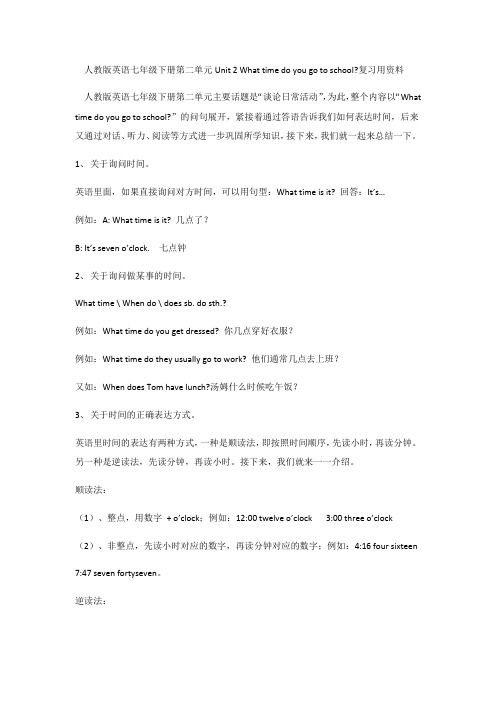
人教版英语七年级下册第二单元Unit 2 What time do you go to school?复习用资料人教版英语七年级下册第二单元主要话题是“谈论日常活动”,为此,整个内容以“What time do you go to school?”的问句展开,紧接着通过答语告诉我们如何表达时间,后来又通过对话、听力、阅读等方式进一步巩固所学知识,接下来,我们就一起来总结一下。
1、关于询问时间。
英语里面,如果直接询问对方时间,可以用句型:What time is it? 回答:It’s…例如:A: What time is it? 几点了?B: It’s seven o’clock. 七点钟2、关于询问做某事的时间。
What time \ When do \ does sb. do sth.?例如:What time do you get dressed? 你几点穿好衣服?例如:What time do they usually go to work? 他们通常几点去上班?又如:When does Tom have lunch?汤姆什么时候吃午饭?3、关于时间的正确表达方式。
英语里时间的表达有两种方式,一种是顺读法,即按照时间顺序,先读小时,再读分钟。
另一种是逆读法,先读分钟,再读小时。
接下来,我们就来一一介绍。
顺读法:(1)、整点,用数字+ o’clock;例如:12:00 twelve o’clock 3:00 three o’clock (2)、非整点,先读小时对应的数字,再读分钟对应的数字;例如:4:16 four sixteen 7:47 seven fortyseven。
逆读法:(1)、当分钟数小于30时,用“分钟对应的数字+ past + 小时对应的数字”,例如:8:12 twelve past eight 9:28 twentyeight past nine 10:08 eight past ten特殊情况:当分钟数等于15时,15可以用英语单词“a quarter来表示”,例如:6:15 a quarter past six;又如:9:30half past nine。
新人教 英语 七年级下册Unit2 What time do you go to school知识点详解

Unit 2 What time do you go to school?知识点详解单元目标总览:【知识点详解】1、What time do you usually get up,Rick?what time 意为“几点;什么时间”,其引导的特殊疑问句用来询问具体的时间点◆---What time do you get up in the morning?你早上几点起床?---At about 7 o’clock.大约在7点。
拓展:what time与whenwhat time翻译为“几点”问的是具体的时间,一般回答要具体到小时。
What time do you go to school? 你什么时候/几点上学?I go to school at half past seven o’clock. 我七点半去上学。
回答具体到点钟,且注意在几点前边的介词用at。
when也是对时间的提问,但与what time的区别是:用when提问,回答既可以是具体的时间,也可以是不具体的时间,如:in the morning,last year,in 1998等范围大的时间,例如:When does he take a shower?他什么时候洗澡?He takes a shower in the morning. 他在早上洗澡。
也可用具体时间:I take a shower at 6 o’clock in the morning. 我早上六点洗澡。
2、get dressed穿上衣服dress做动词,意为“穿衣服”,其宾语多是人,常用短语:dress sb 给某人穿衣服◆The boy can dress himself.这个男孩可以自己穿衣服。
get dressed穿上衣服,表示动作◆Get up and get dressed.起床穿衣服。
be dressed in 穿着,强调状态◆She is dressed in red clothes.她穿着红色的衣服。
- 1、下载文档前请自行甄别文档内容的完整性,平台不提供额外的编辑、内容补充、找答案等附加服务。
- 2、"仅部分预览"的文档,不可在线预览部分如存在完整性等问题,可反馈申请退款(可完整预览的文档不适用该条件!)。
- 3、如文档侵犯您的权益,请联系客服反馈,我们会尽快为您处理(人工客服工作时间:9:00-18:30)。
多有趣的时间 what a funny time 早餐后 为了到达上班的地方 after breakfast to get to work 乘坐十七路公车 take the number 17 bus 载他去上班 take him to work 整个晚上 all night 喜爱听他 love to listen to him 看早间电视 watch morning TV 他的工作 his job go to school get to school go to work get to work go home get home
=He takes the number 17 bus to get to work. =The number 17 bus takes him to work. 4. 他整晚工作. take sb to work He works all night. 6. after breakfast 5 人们喜欢听他(弹)。 7. watch morning TV
4:15p.m 5:30p.m. 7:15p.m.
9:00p.m.
改下列动词为第三人称单数形式: help helps like likes 1.一般的动词后加s. get gets want wants swim swims 2. 以s, x, ch, sh, o 结尾的动 find finds 词加es. play plays watch watches brush brushes 3.以辅音字母加y结尾的动词, teach teaches 去y加ies. go goes do does Study Studies
用括号里的单词的适当形式填空。
go 1. Mary wants to ________ to a movie on Sunday. (go) goes to a movie on Sunday. (go) 2. Mary _______ does his homework at 7 in the evening. (do) 3. Scott ________ Do Alan and Alice like to play basketball? (do) 4. ________ 5. ________ Does your father have a watch? (do)
昨日难点与重点
1. What a +形容词+time to do … 2. love to do …喜欢做某事 want to do …想要做某事 3. listen to sth /sb
1. 他工作很长时间。
He works very long hours.
2.多么滑稽的时间吃早饭啊!
重点
What a funny time to eat breakfast! To get to work,he takes the number 17 bus.
ECB
1.What time do you usually go to bed? 2.What does he do at seven o’clock? 3. What’s the time? 三、1. have 2. takes, to go 3. to listen
作业
4. to go
5. studies 6. brush, brushes
3. 他乘17路公共汽车去上班。
People love to listen to him.
你能猜猜他的工作是什么吗?
Can you think what his job is
Can you tell me about Scott’s day?
Scott’s day
17:00 17:10 17:25
gets
brushes
takes
17
17:50 18:00 19:15
eats / has
plays
takes
goes
8:30
When people usually usually get up? get up? Whatdo time do people They get upup in the morning. Theyusually usually get at 6:15.
What do people usually do in the morning?
What do people usually do in the morning?
in the morning:
get up
brush teeth eat breakfast go to work go to school watch morning TV run take a shower
Unit2 The third period What time do you go to school?
December24th Tuesday
1. love to listen to him 2. do homework 3. to get to work 4. get home 5. brush teeth 6. take him to work 7. all night 8. his job 9. long hours 10. take the number 17 bus 11. go to bed 12. watch morning TV
study work
get home
play sports
People usually …in the afternnon.
What do people usually do in the evening?
in the evening:
watch TV go to a movie do homework go to bed read books read books listen to music
listen to music
People usually …in the evening.
P68 1a
1.get up 2.run
5:00 6:00 7:00 8:00
P 68 2a 2b
3.eat breakfast
4.go to school 5.go home 6.do homework 7.eat dinner 8.go to bed
go to work take a bus take a bus to go to work
People usually …in the morning.
What do people usually do in the afternoon?
in the afternoon: study work go home get home play sports
